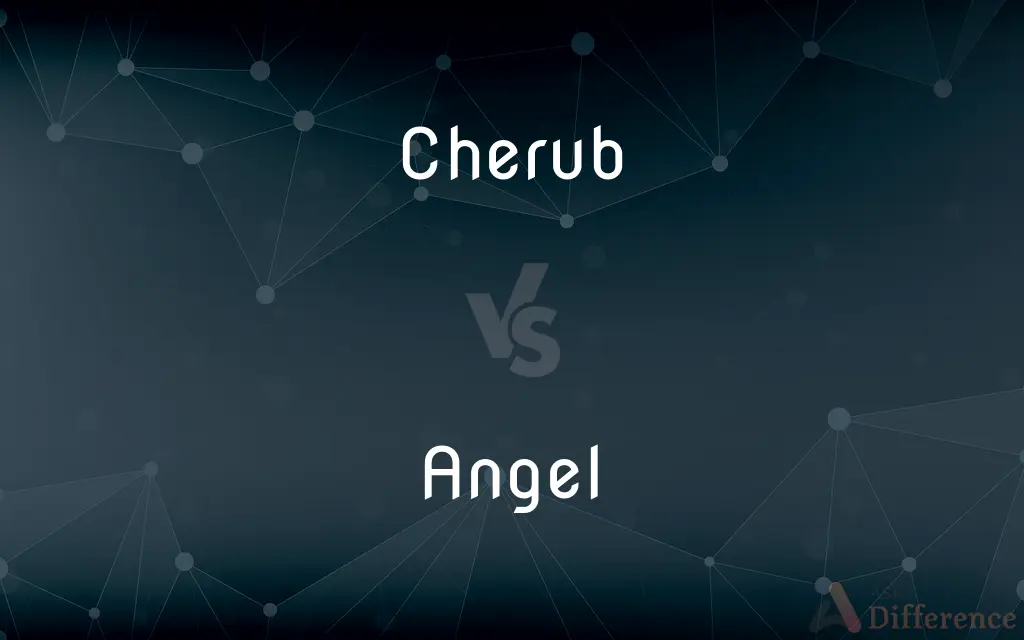Cherub vs. Angel — What's the Difference?
By Tayyaba Rehman — Updated on May 27, 2024
Cherubs are a specific type of angel, often depicted as innocent and childlike, while angels are general messengers and agents of God in various forms.

Difference Between Cherub and Angel
Table of Contents
ADVERTISEMENT
Key Differences
Cherubs, according to biblical tradition, are a high-ranking order of angels often associated with the presence of God. They are depicted in various ways throughout history, with early representations showing them with multiple wings and faces. Angels, more broadly, are celestial beings created by God, tasked with serving as messengers and agents of divine will.
In art and modern culture, cherubs are typically shown as chubby, rosy-cheeked children with small wings, symbolizing innocence and love. This is quite different from the wider category of angels, which are usually portrayed as majestic, powerful adults with large wings, representing purity, and the divine.
The term "cherub" is derived from the Hebrew word “keruv,” which has roots in biblical scriptures and is specifically mentioned in descriptions of the Garden of Eden and the Ark of the Covenant. The term "angel" comes from the Greek word "angelos," meaning messenger, reflecting their role in various religious texts to deliver God's messages to humans.
Cherubs have a specific role in theological cosmology, being tasked with guarding sacred spaces and serving near the throne of God, as seen in Ezekiel and Revelation. Angels, however, have a broader set of responsibilities, including guiding, protecting humans, and carrying out judgments.
Although cherubs are indeed angels, not all angels are cherubs. This distinction points to the hierarchy within the celestial orders where cherubs hold a special place, while the term "angel" encompasses all divine messengers across various ranks and functions.
ADVERTISEMENT
Comparison Chart
Definition
A high-ranking angelic being
A spiritual being acting as a messenger of God
Iconography
Depicted as young children or creatures with multiple wings
Typically depicted as adults with wings
Biblical Mention
Associated with the presence of God and sacred duties
Mentioned throughout religious texts as messengers and guardians
Symbolism
Represents innocence and divine wisdom
Symbolizes divine presence, purity, and the link between heaven and earth
Roles
Guarding the throne of God and sacred spaces
Delivering messages, guiding souls, and serving God’s will
Compare with Definitions
Cherub
A symbol of love or the sacred.
Valentine's Day cards often have cherubs with bows and arrows.
Angel
A spiritual being believed to act as a messenger of God.
The angel Gabriel is known for announcing the birth of Jesus.
Cherub
A member of the second highest order of angels.
The cherub stood guard by the divine throne.
Angel
A person with a very kind and pure heart.
He was an angel to volunteer at the shelter every weekend.
Cherub
A beautiful or innocent-looking child.
The toddler's cherub-like face melted everyone's hearts.
Angel
A financial backer of a venture or a play, often anonymous.
The startup found an angel investor to launch their project.
Cherub
A winged celestial being.
Angel
An angel is a supernatural being in various religions. The theological study of angels is known as angelology.
Cherub
A cherub (; plural cherubim; Hebrew: כְּרוּב kərūv, pl. כְּרוּבִים kərūvîm, krūvîm, likely borrowed from a derived form of Akkadian: ??? karābu "to bless" such as ??? kāribu "one who blesses", a name for the lamassu) is one of the unearthly beings who directly attend to God, according to Abrahamic religions.
Angel
A spiritual being believed to act as an attendant, agent, or messenger of God, conventionally represented in human form with wings and a long robe
The Angel of Death
God sent an angel to talk to Gideon
Cherub
Cherubim(Christianity) The second of the nine orders of angels in medieval angelology.
Angel
A person of exemplary conduct or virtue
Their parents think they are angels
I know I'm no angel
Cherub
A putto.
Angel
A person who supports a business financially, typically one who invests private capital in a small or newly established enterprise
The longer it takes you to get your product into the marketplace, the longer it will be until the angels get their money back
Cherub
A person, especially a child, with an innocent or chubby face.
Angel
A former English coin minted between the reigns of Edward IV and Charles I and bearing the figure of the archangel Michael killing a dragon.
Cherub
(biblical) A winged creature attending God, described by Pseudo-Dionysius the Areopagite (short=yes) as the second highest order of angels, ranked above thrones and below seraphim; similar to a lamassu in the pre-exilic texts of the Hebrew Bible, more humanoid in later texts.
Angel
An aircraft's altitude (often used with a numeral indicating thousands of feet)
We rendezvous at angels nine
Cherub
An artistic depiction of such a being, typically in the form of a winged child or a child's head with wings but no body.
Angel
An unexplained radar echo.
Cherub
(figuratively) A person, especially a child, seen as being particularly angelic or innocent.
Angel
A typically benevolent celestial being that acts as an intermediary between heaven and earth, especially in Christianity, Judaism, Islam, and Zoroastrianism.
Cherub
A mysterious composite being, the winged footstool and chariot of the Almighty, described in Ezekiel i. and x.
I knew that they were the cherubim.
He rode upon a cherub and did fly.
Angel
A representation of such a being, especially in Christianity, conventionally in the image of a human figure with a halo and wings.
Cherub
A symbolical winged figure of unknown form used in connection with the mercy seat of the Jewish Ark and Temple.
Angel
Angels(Christianity) The last of the nine orders of angels in medieval angelology. From the highest to the lowest in rank, the orders are
Seraphim, cherubim, thrones, dominations or dominions, virtues, powers, principalities, archangels, and angels.
Cherub
One of a order of angels, variously represented in art. In European painting the cherubim have been shown as blue, to denote knowledge, as distinguished from the seraphim (see Seraph), and in later art the children's heads with wings are generally called cherubs.
Angel
A guardian spirit or guiding influence.
Cherub
A beautiful child; - so called because artists have represented cherubs as beautiful children.
Angel
A kind and lovable person.
Cherub
A sweet innocent baby
Angel
One who manifests goodness, purity, and selflessness.
Cherub
An angel of the second order whose gift is knowledge; usually portrayed as a winged child
Angel
A financial backer of an enterprise, especially a dramatic production or a political campaign.
Cherub
A representation of a small angel, typically a child with a plump, rosy face.
The garden statue featured a cherub with a mischievous smile.
Angel
An incorporeal and sometimes divine messenger from a deity, or other divine entity, often depicted in art as a youthful winged figure in flowing robes.
Angel
(Abrahamic tradition) One of the lowest order of such beings, below virtues.
Angel
A person having the qualities attributed to angels, such as purity or selflessness.
Thanks for making me breakfast in bed, you little angel.
Angel
(obsolete) Attendant spirit; genius; demon.
Angel
An official (a bishop, or sometimes a minister) who heads a Christian church, especially a Catholic Apostolic Church.
Angel
(historical) An English gold coin, bearing the figure of the archangel Michael, circulated between the 15th and 17th centuries, and varying in value from six shillings and eightpence to ten shillings.
Angel
An altitude, measured in thousands of feet.
Angel
An unidentified flying object detected by air traffic control radar.
Angel
(finance) An angel investor.
Angel
(theater) The person who funds a show.
Angel
(informal) A person who has Angelman syndrome.
Angel
To support by donating money.
Angel
A messenger.
The dear good angel of the Spring,The nightingale.
Angel
A spiritual, celestial being, superior to man in power and intelligence. In the Scriptures the angels appear as God's messengers.
O, welcome, pure-eyed Faith, white-handed Hope,Thou hovering angel, girt with golden wings.
Angel
One of a class of "fallen angels;" an evil spirit; as, the devil and his angels.
Angel
A minister or pastor of a church, as in the Seven Asiatic churches.
Unto the angel of the church of Ephesus write.
Angel
Attendant spirit; genius; demon.
Angel
An appellation given to a person supposed to be of angelic goodness or loveliness; a darling.
When pain and anguish wring the brow,A ministering angel thou.
Angel
An ancient gold coin of England, bearing the figure of the archangel Michael. It varied in value from 6s. 8d. to 10s.
Angel
Spiritual being attendant upon God
Angel
Person of exceptional holiness
Angel
Invests in a theatrical production
Angel
The highest waterfall; has more than one leap; flow varies seasonally
Angel
A term of endearment for someone loved or cherished.
His mother called him her little angel as she tucked him in.
Common Curiosities
Can a cherub be a guardian angel?
While cherubs have guarded sacred items in scripture, guardian angels specifically refer to those that protect humans.
Are all cherubs angels?
Yes, all cherubs are considered a type of angel.
Why are cherubs depicted as babies?
The Renaissance period popularized the depiction of cherubs as babies, symbolizing innocence and purity.
Are cherubs involved in religious rituals?
Not typically in modern practices, but they hold symbolic importance in many religious narratives.
What primarily differentiates a cherub from an angel?
Cherubs are a specific order of angels often depicted as children, whereas angels have a broader representation and roles.
Are angels or cherubs part of all religions?
Variations of angels appear in many, but not all, world religions.
Can both cherubs and angels fall from grace?
In some traditions, angels, including cherubs, can fall from grace, but this is not universally accepted.
Can humans become angels or cherubs after death?
This is a matter of personal belief and religious doctrine; traditionally, angels are seen as separate creations from humans.
How many wings do cherubs have?
In biblical accounts, cherubs are described as having multiple wings, often four.
Do angels and cherubs look the same?
In traditional texts, no; cherubs have unique features, while angels resemble humans with wings.
Do cherubs and angels appear in the same religious texts?
Yes, they are both mentioned in various religious scriptures, including the Bible.
Is the term ‘cherub’ ever used colloquially?
Yes, it’s often used to describe a cute or cherubic child.
Is the role of an angel always benevolent?
In religious texts, angels serve the will of God, which can be protective or punitive.
Do cherubs sing as often portrayed in art?
Artistic interpretations show cherubs singing, but scripturally, their primary role is not described as singing.
How can one distinguish between cherub and angel art?
Cherub art typically features child-like figures, while angel art usually depicts more adult, majestic figures.
Share Your Discovery

Previous Comparison
Haven vs. Heaven
Next Comparison
Sea vs. OceanAuthor Spotlight
Written by
Tayyaba RehmanTayyaba Rehman is a distinguished writer, currently serving as a primary contributor to askdifference.com. As a researcher in semantics and etymology, Tayyaba's passion for the complexity of languages and their distinctions has found a perfect home on the platform. Tayyaba delves into the intricacies of language, distinguishing between commonly confused words and phrases, thereby providing clarity for readers worldwide.













































